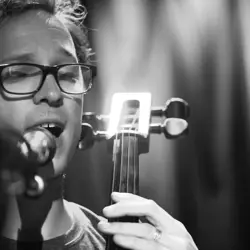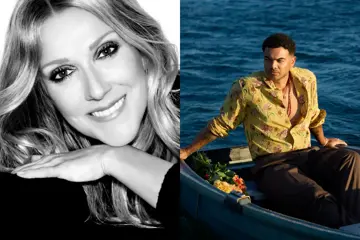 Ben Sollee
Ben SolleeMusicians just don't travel like they used to. Not now that they can ride across countries in their own state of the art bus with all the comforts of home, or pile into the back of a car, or fly from city to city skipping over all the towns in between. That is unless you're Kentucky native Ben Sollee, who does at least a third of his touring on a bicycle with his cello strapped to the back. “We haul all of our gear on bicycles without a support vehicle and we travel from community to community,” Sollee explains, as lungs are sucked dry just thinking about it. “The purpose of these tours is not to be green – whatever that means these days – or sustainable, it's really to slow down, use the limitations of the bicycles and be more community-orientated. In the places where we're playing, the people are more involved in the shows. It's really a lovely thing.”
This is one of several standout elements to Sollee, who is a formidable cellist with a soulful voice and an interest in social issues, which are things that over the years he has combined as a solo artist as well as in collaborative projects. He is often hailed as an activist and charged with being a classically-trained musician who instead of sticking to Bach and Mozart, chose to mix genres such as soul, r'n'b, blues, bluegrass, jazz, folk – perhaps a few more – and defy the traditional borders of genres. In 2008 he released two EPs before his first full-length, Learning To Bend, caught the attention of the industry and generated well-deserved praise. 2011's Inclusions is the follow-up and the album that sees him coming to do his first tour of Australia, where he will travel in petrol-dependent vehicles and not on a bike.
There are two styles of activism Sollee is often described as having a hand in – the social kind and the more musical fact that he has come to use his cello to imitate other instruments rather than keep things classic. However, it's a label that he tends to shy away from.
“I'm not that trained classically. If people compared me to their pet dog or something I would not be a very obedient dog, I would go off the rails,” he chuckles. “The inspiration to go play other styles just came from my social life. I would go study privately with all my teachers and then I would go home and want to jam with my dad, who was a guitar player, or my grandad who was a fiddler and all my friends who played other instruments. Your classical music wasn't the music that they jammed on – they didn't know how to do that – so I would learn what they played, which was old r'n'b tunes and fiddle tunes and, you know, pop music. So I had this cello and that was how it happened. There was no conscious decision to be like, 'I'm going to make this instrument change or be innovative with it'. It was just sitting down and trying to play with folks.”
Don't miss a beat with our FREE daily newsletter
In terms of his social activism, Sollee states that he has never “physically chained” himself to anything. “I often shy away from being referred to as an activist, because I feel like an activist is a very special person who spends a lot of time really honing their skills of how to spread a message and how to create change and make people aware of problems. I know activists and I'm not as skilled as they are, however I do share a lot of their sentiments and do put a lot of effort into raising awareness about things that I care about.”
Much of Sollee's work has addressed socio-political issues, things like liveability infrastructure (hence bike touring) and mountain strip-mining – a form of mining that blows the tops off mountains in order to get at the coal supplies within. A collaborative effort with singer/songwriter Daniel Martin Moore and Jim James (My Morning Jacket) called Dear Companion was created to raise awareness of this particular kind of mining taking place in Appalachia. But as he points out, Inclusions is more of a “humanistic” record. “It flies on a person-to-person level. As I do more and more records, I find myself relating to more and more people with my own personal story. I don't feel like I'm the only person going through this stuff and in that way I feel as though the more personal I get, the more universal my stuff gets. It's a really interesting dichotomy.”
On Inclusions, Sollee continues to traverse a vast landscape of genres. Classic blues-style guitar (it's actually the cello) permeates The Globe, Close To You harks back to the days of the big band, while Electrified sounds exactly that – electrified (again, sounds made by Sollee's cello could be easily confused as an electric guitar). However, between these more upbeat tracks are slow jazz and soul numbers such as Bible Belt.
“Bible Belt is an obvious standout for me because it's so close to the heart and, oh gosh, it's a story that so many people my age have gone through. Young love, coming together really quickly and all the stuff that goes together with that. There are other songs that are more universal as well. I think Hurting is the song that overall on the record stands out to me, because I feel like we all go through that and just understanding that each of us struggles – and I'm not going to compare that or say that one person struggles more than the other – is a very important thing to understand, to be able to move past the struggles in this world.”
For all his talent as a lyricist and composer, a compassionate individual dedicated to speaking (or singing) out against environmental and social injustice on our planet, take these things away and you would still have a musician worth seeing if only for the way he plays that cello.
“I've been calling it the Swiss army knife of the orchestra; it can really do so many things and composers use it to do so many things. It can support, it can do rhythm, it can do melodies, textures – it's an amazing instrument in that way. And as I've played in different bands with different musicians I have taken on styles. I can play things that are very much electric sounding – electric guitar sounds – I've done a lot imitating drums; as I toured through China I picked up a lot of ornamentations and vocalising like Chinese opera instruments. The cello can really embody so many things and that's a really great tool for a songwriter, because you often find yourself writing about a huge variation of topics and the cello seems to help along the narrative in almost every case.”















